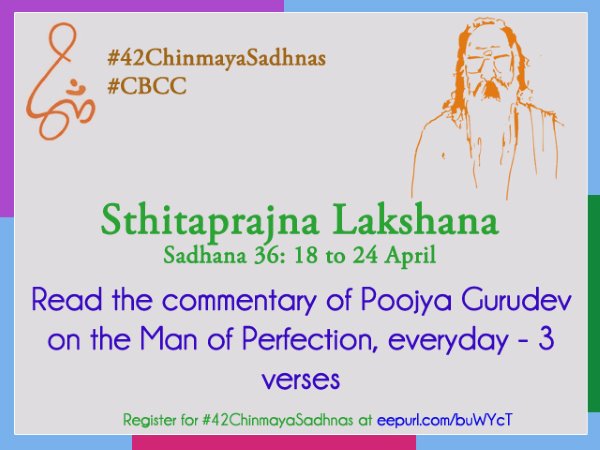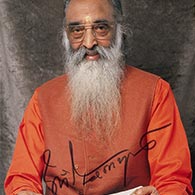Sadhana for Week 36
Intellect Level: Sthitaprajna Lakshana
Read the commentary of Poojya Gurudev on the Man of Perfection, everyday - 3 verses.

Quote:
The Man of Perfection is like a breeze hat passes by without asking. When the windows are open, it purifies the atmosphere by its mere passing. It changes its direction without hesitation when the door is closed.
Beholding the presence of divinity everywhere at all times,
Mahatmas live in love,
Move in compassion and
Breathe in service.
The average man looks up at night, and sees thousands and thousands of twinkling stars, each different from the other. But a man wisdom and achievement, perceives the one light, behind the dark dome of the night sky, whose incandescence peeps at us through all holes in the night-dome! To see the one in many is the casual vision of knowledge. To see the many in one, is the vision of wisdom.
Anecdote 1:
There was once a youngster who was sitting with Poojya Gurudev during a satsang. He asked Poojya Gurudev, “Swamiji, you were a lawyer, a journalistic. You were working with the National Herald. You have also studied English literature, you are so highly qualified. Then why did you leave all that and become a Sanyasi?
Poojya Gurudev loved an inquisitive mind, especially that of a young one. If the question was from a skeptic, Poojya Gurudev loved it even more. At that time the boy was chewing gum. Poojya Gurudev looked directly at him and asked, “When will you spit that gum? The boy replied, “When I have chewed it enough and there is no more juice in it.”
Poojya Gurudev immediately said, “Ah! Like you I have chewed the world enough. There is no rasa in samsara, so I spat it out!”
Anecdote 2:
Once someone asked Poojya Gurudev, “Why does a realized person work?”
He replied:
When one realizes the Truth, one becomes irresistibly vibrant with life. In Divine spontaneity, activity gurgles through him. The physical equipment is generally too frail a reed to stand the blazing gush of love and work; therefore such Prophetic Masters generally fold up in a blinding flash of brilliant service to mankind, carried on for a short duration of perhaps twenty or thirty years.
Your question is “Why should he work?” Can you tell me why the sun is illuminating everything around it? Why fire is hot; sugar sweet; ocean waters salty? Why birds fly; flowers bloom; mirrors reflect; air moves; earth revolves?...Are they not expressing their essential nature? Can anyone of them remain without their essential property? The Realized saint is not responsible for what he is doing. He is one with Life. And Life expresses itself in action.”
Anecdote 3:
Once Poojya Gurudev had gone to Jaipur to purchase an idol for Chinmaya Mission’s Deenabandhu Temple in Bangalore.
There he found the brass idol of Krishna that he was looking for. However the shopkeeper was unwilling to sell just Krishna, he said he only sold Krishna as a pair with Radha. After a lot of persuading Poojya Gurudev said, “I want this Krishna. I am His Radha. I don’t need another Radha. There is only one Purusha (the Absolute, transcendent Self)”
The shopkeeper looked at Poojya Gurudev with stunned eyes and quietly handed over the idol of Krishna to him.
“Mahatmaji”, he said, “Whatever you want, just tell me. I’ll let you have it.”
Who is a “Sthitaprajna”?
A man of wisdom lives in the world, but he is never of the world.
- Swami Chinmayananda
All our scriptural texts be it the Vedas, Upanishads, puranas, the teachings of our rishis, saints and sages, our religious practices, our culture – all of them are means, sadhanas, to help us transcend our body, mind and intellect and to let go of our ego so that one is able to enter into the state of Samadhi and come to know the Supreme Self.
But what is this state naturally we all want to know and more importantly why should we even strive to achieve that state. Will knowing that state change anything in me – my perception of the world will it change, my family will it remain, will the world remain, what will become of me??? So many thoughts run through our minds.
In the Bhagvat Geeta, chapter 2, Arjuna too asks Sri Krishna these questions:
- Who is a Man of Realization?
- What is the state of Samadhi?
- What does a Man of Realization experience in that state and how does he behave after knowing the Truth?
This is the beauty of our culture – you can ask questions, disagree, not believe etc. In fact all our scriptures of Sanatana Dharma – the Upanishads, Geeta have all come about as a result of the question – answer between a student and the Guru.
Poojya Gurudev always said that doubts and questions are the windows through which the teacher peeps into the soul of the student. The teacher can see the level of the student and understand why the student is asking the question.
“Sthitaprajna”is a word whichis unique to the Geeta. It is not present in the Upanishads or the Vedas. Ved Vyasaji specially coined it for the Geeta. “Sthita” means established. “Prajna” means our wisdom or intellect. Literally it means one whose wisdom is established, one who is centered in this knowledge. Our mind always oscillates among the different roles we play because we don’t know the Reality. Apart from the roles we play we have no knowledge of our true identity. We identify with our limited, finite roles - mother, father, son, daughter, employer, employee, friend, etc. Sthitaprajna is a person who has centered himself in the Absolute Truth, the Supreme Reality.
A Brahmatman is one whose Atman has become one with Brahman;
One who has found his identity with the Self everywhere.
He is called Brahmavid,
The knower of Brahman.
- Swami Chinmayananda
Why do I need to know about “Sthitaprajna Lakshana”?
What are its benefits?
A man firmly established in freedom is tranquil.
His equipoise is never broken,
Even when he is investing his entire energies on the world outside for the service of mankind.
- Swami Chinmayananda
Sthitaprajna Lakshana – the characteristics of the Man of Perfection - is the most celebrated part of the Geeta.
In these 18 verses of the Geeta in Chapter 2 from verse 55 to verse 72 the Lord gives Arjuna the answer to his question that what are the qualities of a fulfilled person. These 18 verses act like a lighthouse to us in the ocean of samsara reminding us of the goal that each one of us has to reach. Gandhiji used to recite these 18 verses every evening to remind himself of the Goal of Life.
These are the qualities that a Person of Fulfillment expresses spontaneously. But for us these qualities become our sadhana. It is said:
siddhasya lakshanani, sadhakasya sadhanani
– the attributes or the natural traits of a Man of Wisdom are the sadhana for a Seeker.
This can be applied to any sphere of life e.g in the game of cricket an accomplished cricketer plays those master strokes effortlessly which become the sadhana for a person who is still practicing. One has to keep on practicing till it becomes one’s own nature.
The beauty of these 18 verses is that all levels are covered - body, mind, intellect, relationship, sense objects – and they give us guidance of how to have the right relationship at each level.
By chanting these verses daily we become aware of our progress towards them and if we are cultivating the qualities mentioned. They serve as a powerful reminder of what I have to do and achieve in this life.
Any activity undertaken by a perfect Master
Does not and cannot bring about any consequences,
Good or evil upon Him.
He is only a divine instrument.
- Swami Chinmayananda
How to?
1. Read the commentary of Poojya Gurudev on the Man of Perfection, everyday - 3 verses.
- Chapter 2, verses 55 to 72 describe Sthitaprajna Lakshana.
Learn to chant these verses.
- Read the commentary by Poojya Gurudev – 3 verses every day.
2. Reflection
Daily reflect on what you have read. One can ask oneself these questions:
• What am I centered in while going through life?
• Am I centered in ego, or in money, some relationship, or power?
• Or am I centered in the attitude that I am a seeker?
• What is my primary identity – throughout the day what do I look at myself as?
• As a seeker what is coming in the way of my happiness?
• Is there something on which I depend?
3. Strive to remove the obstacles through practice and right understanding
In the Geeta Bhagwan says the distance between us and moksha is only desire. More the desires, more the extrovertedness. These agitations in the mind move us away from our true nature.
If there is something on which I depend, I have to remove these delusions from my mind. The more one removes the false notions the mind will become stronger and independent. The more independent the mind is, one can turn it inwards and contemplate on the Self.
Identify one dependency and strive to overcome it.
If we have absolute faith in the Lord, our Guru, our scriptures and ourselves, if we are willing to work hard, if we are consistent, if we have the right understanding and cultivate the qualities prescribed in our scriptures we too can get liberated in this life itself!
We can, we must, we will!
- Swami Chinmayananda
Beginners and Advanced:
Beginners:
Do as advised above.
Advanced seeker:
1. Do as advised above.
2. Memorize the 18 verses and chant daily before reading the commentary.
3. After you read the commentary, choose a verse from the 18 and silently repeat it and contemplate on it.
4. Make the mind still and get into the state of Samadhi.
.jpg)
UNTO HIM OUR BEST


